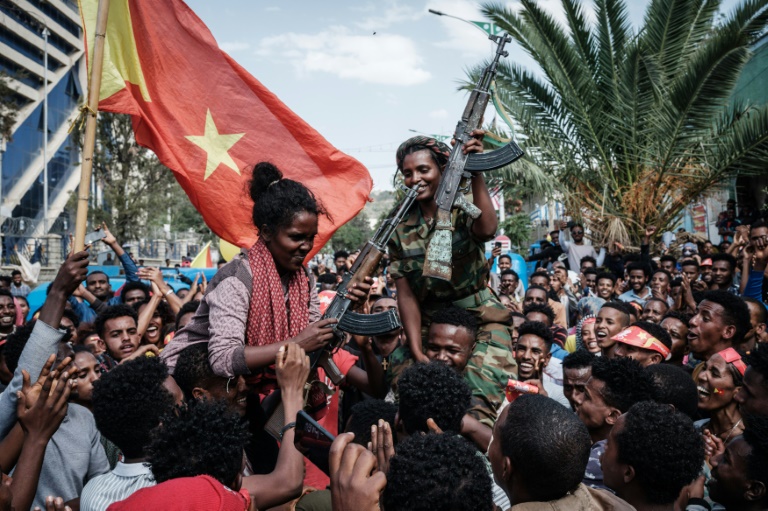Celebrations erupted on the streets of the capital of Ethiopia’s Tigray region this week when rebel fighters took over the city, a pivotal moment in a brutal eight-month long conflict.
Crowds of jubilant locals waving the red and yellow Tigrayan flag cheered, clapped and danced in Mekele as they welcomed the returning Tigray Defence Force (TDF) soldiers.
The rebels marched into the city on Monday after local officials and federal government troops pulled out, and the government of Prime Minister Abiy Ahmed later declared a unilateral ceasefire.
Supporters carried the victorious gun-toting TDF fighters — both men and women — aloft to the sound of tooting car and motorbike horns, while beaming women embraced their returning menfolk.
Local residents lined the streets as the rebels moved through on foot or piled onto trucks, some reaching out to touch them from passing buses.
It was a far cry from the atmosphere of Mekele under federal forces, which had imposed a strict curfew that left the city’s normally bustling streets dead quiet.
“Everybody is out of their house.
Everybody is excited and they have music on the streets,” one Mekele resident told AFP as the first TDF fighters trickled in.
“Everybody has their flags out and music is playing. Everybody, I don’t know how they got it, but everybody has fireworks.”
Since marching on Mekele, the TDF has seized more control of territory in Tigray, Ethiopia’s northernmost region, and vowed to drive out all its “enemies” — federal soldiers and their allies, notably from neighbouring Eritrea and Ethiopia’s Amhara region.
The government in Addis Ababa has for its part called on the rebels to adhere to its unilateral ceasefire, with the foreign ministry spokesman saying on Thursday “it needs two to tango”.
But there are heightened fears for the plight of hundreds of thousands of people in the region enduring famine conditions, with two critical access roads destroyed this week.
Though Mekele has undoubtedly fared better than more remote parts of Tigray, the city still bears the scars of a conflict marked by stark civilian suffering.
Many of the city’s schools have served as camps for the displaced.
Its paediatric wards teem with children nursing bullet and shrapnel wounds, some of whom have had limbs blown off.
And some women walk the streets wearing black as news of dead relatives trickles in from rural areas that remain inaccessible.











